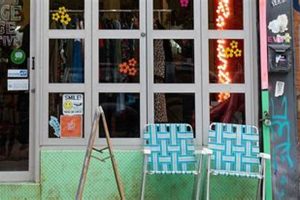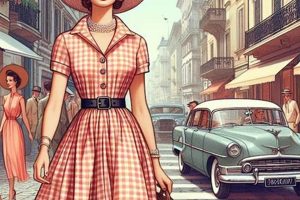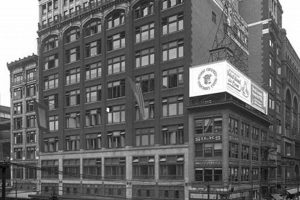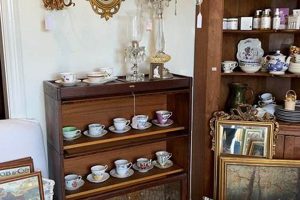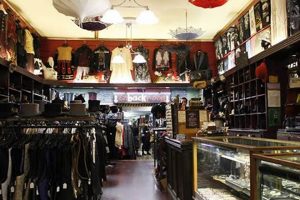Establishments in the Virginia capital that specialize in previously owned clothing, accessories, and home goods from past eras constitute a significant retail sector. These businesses offer a curated selection of items, typically spanning several decades, appealing to consumers seeking unique and often historically significant pieces. For example, a shop might feature apparel from the 1960s alongside mid-century modern furniture.
These establishments provide several benefits to both consumers and the community. They offer an alternative to mass-produced goods, promoting sustainable consumption by extending the lifespan of existing products. Additionally, they contribute to the local economy, often supporting independent business owners and creating a distinctive shopping experience. The preservation and showcasing of historical artifacts through these retail venues also enrich the cultural landscape.
A deeper examination of this retail landscape reveals several key aspects worthy of exploration. Considerations include the types of merchandise offered, the specific historical periods represented, the geographical distribution of businesses within the city, and the economic factors influencing their operation and popularity.
Effective navigation of the market segment dedicated to curated collections from past eras requires a strategic approach. The following points offer insights into maximizing value and minimizing potential pitfalls when engaging with establishments offering such goods in the Virginia capital.
Tip 1: Establish Clear Acquisition Objectives: Prior to engaging with any establishment, define specific needs and desired items. This focused approach minimizes impulse purchases and ensures acquisitions align with pre-defined goals, whether for personal use, collection, or resale.
Tip 2: Conduct Thorough Item Inspection: Evaluate the condition of all prospective acquisitions meticulously. Assess for damage, wear, and authenticity. Request detailed information regarding an item’s provenance and any restoration or repairs performed.
Tip 3: Research Comparative Market Values: Before finalizing any purchase, investigate similar items available through online marketplaces, auction houses, and other specialized retailers. This comparative analysis facilitates informed decision-making and ensures competitive pricing.
Tip 4: Inquire About Return Policies: Clarify the establishment’s return policy prior to purchase. Understanding the terms of returns, exchanges, and refunds safeguards against unforeseen circumstances, such as undisclosed defects or misrepresented items.
Tip 5: Assess Storage and Maintenance Requirements: Account for the long-term storage and maintenance needs of acquired items. Delicate or historically significant pieces may necessitate specialized care, including climate-controlled storage and professional cleaning services.
Tip 6: Consider Alteration Possibilities: When acquiring apparel, assess the feasibility of alterations to ensure proper fit and desired aesthetic. Factor alteration costs into the overall acquisition budget, acknowledging potential tailoring limitations.
The application of these strategic considerations will facilitate a more rewarding and efficient engagement with the market segment specializing in curated collections of pre-owned goods.
The subsequent sections will elaborate on specific establishment types and the methods employed in their operations.
1. Curated collections
The concept of curated collections is central to understanding the function and appeal of establishments offering pre-owned goods in Richmond, Virginia. Unlike general thrift stores that accept a wide range of donations, these businesses typically focus on selecting items that meet specific criteria related to era, style, designer, or condition. This deliberate selection process is a defining characteristic, effectively transforming a random assortment of used items into a cohesive and appealing inventory. For instance, a store might specialize in clothing from the 1950s and 1960s, carefully choosing pieces that reflect the aesthetic trends of those decades and are in good, wearable condition. Another might emphasize designer handbags or mid-century modern furniture. This deliberate approach is driven by a desire to cater to a particular clientele and to differentiate themselves from other retailers in the secondhand market.
The importance of curated collections within these businesses is multifaceted. From a business perspective, it allows for targeted marketing and inventory management. By focusing on a specific niche, a store can attract customers who are specifically interested in that style or period. This enables them to develop expertise in that area and build a loyal customer base. Furthermore, a curated collection often commands higher prices than a random assortment of used goods. Consumers are willing to pay more for items that are carefully selected and presented, especially if they are difficult to find elsewhere. For example, a carefully curated collection of vintage band t-shirts in excellent condition might command significantly higher prices than the same t-shirts found in a general thrift store.
In summary, the emphasis on carefully chosen selections is not merely an aesthetic choice but a fundamental business strategy for establishments in Richmond specializing in pre-owned goods. It differentiates them from general thrift stores, allows for targeted marketing and pricing, and ultimately contributes to their success. The ongoing challenge lies in maintaining a consistent supply of high-quality, desirable items to meet the demands of their clientele, while adapting to ever-changing trends and consumer preferences. This requires a keen eye for style, a deep understanding of historical trends, and strong relationships with suppliers.
2. Historical Significance
The establishments that curate and sell pre-owned goods in Richmond, Virginia are intrinsically linked to the concept of historical significance. These businesses serve as conduits through which tangible remnants of the past are preserved, recontextualized, and made accessible to a contemporary audience. The items found within these spaces – clothing, furniture, accessories – often embody specific design aesthetics, manufacturing techniques, and socio-cultural trends of their respective eras. The historical value of these items, therefore, lies not only in their age but also in their capacity to illuminate aspects of past lives, tastes, and societal norms. For example, a vintage dress from the 1950s might reveal details about fabric production methods, prevailing silhouettes, and the social expectations placed upon women during that period. This connection to the past is a primary driver for many consumers who patronize such establishments, seeking to acquire items that possess a unique narrative and connection to history.
The importance of historical context extends beyond mere aesthetic appeal. Knowledge of an item’s provenance, its original purpose, and its place within the broader historical narrative significantly enhances its value and desirability. Businesses that emphasize historical accuracy and authenticity often cultivate a more discerning clientele and command higher prices. For instance, a retailer specializing in vintage military garments might invest in researching the specific unit or campaign associated with a particular uniform, thereby increasing its perceived value and attracting collectors or historical reenactors. Furthermore, these businesses contribute to the preservation of historical knowledge by researching and documenting the origins of their merchandise, providing valuable insights to researchers and enthusiasts alike.
In conclusion, the element of historical significance is a crucial component of the market sector dedicated to pre-owned goods in Richmond. It transforms ordinary commercial transactions into acts of historical preservation and cultural appreciation. Challenges remain in accurately authenticating and documenting the history of individual items, as well as in communicating this historical context to a broader audience. Nonetheless, these establishments play a vital role in connecting the past with the present, enriching the cultural landscape of the region. The presence of these businesses fosters a sense of historical awareness and promotes the appreciation of tangible artifacts from bygone eras.
3. Local economy
The presence of retail establishments specializing in pre-owned goods significantly impacts the local economy of Richmond, Virginia. These businesses, while often smaller in scale than national chains, contribute to the area’s financial health in several distinct ways.
- Job Creation and Retention
These establishments create employment opportunities within the community. While individual stores may not employ a large workforce, the collective impact of numerous independent retailers adds up to a significant number of jobs. These positions range from sales associates and store managers to specialized roles such as buyers, restorers, and marketers. Furthermore, these businesses often prioritize hiring local residents, contributing to a reduction in unemployment rates within the city and fostering a sense of community investment.
- Tax Revenue Generation
Establishments contribute to local tax revenue through sales taxes collected on transactions and property taxes paid on their physical locations. These tax revenues are crucial for funding essential public services such as schools, infrastructure maintenance, and public safety initiatives. The steady stream of tax revenue generated by these businesses contributes to the overall financial stability of the municipality, enabling it to better serve its residents and address local needs.
- Tourism and Destination Appeal
Specialized retail offerings, including those focused on pre-owned goods, contribute to the tourism sector by attracting visitors seeking unique shopping experiences not readily available elsewhere. These businesses can become destination points, drawing tourists to specific neighborhoods and contributing to increased foot traffic for surrounding businesses such as restaurants, cafes, and other retail stores. The resulting influx of tourist dollars supports local economies and enhances the city’s reputation as a cultural and commercial hub.
- Support for Local Suppliers and Artisans
Certain establishments may source merchandise from local suppliers, artists, and craftspeople, further stimulating the local economy. By partnering with local artisans to offer complementary goods or collaborate on unique product lines, these businesses contribute to the growth of a vibrant creative ecosystem within the city. This interconnectedness fosters a sense of community and strengthens the local supply chain, reducing reliance on external suppliers and promoting economic self-sufficiency.
The pre-owned goods market in Richmond, therefore, is not simply a collection of individual stores but an interconnected network that contributes to the overall vitality and sustainability of the local economy. By creating jobs, generating tax revenue, attracting tourists, and supporting local suppliers, these businesses play a vital role in fostering economic growth and enhancing the quality of life for residents of Richmond.
4. Sustainable consumption
The business of retail establishments offering pre-owned goods in Richmond, Virginia, inherently aligns with the principles of sustainable consumption. These businesses extend the life cycle of existing products, thereby mitigating the environmental impact associated with manufacturing new items. By providing an alternative to purchasing newly produced goods, they reduce the demand for raw materials, energy consumption, and waste generation. This aligns with a broader societal shift towards more responsible and environmentally conscious consumption patterns. The availability of clothing, furniture, and other goods from previous eras reduces pressure on resource extraction and lowers carbon emissions associated with production and transportation. The act of purchasing a pre-owned item is, therefore, a deliberate choice to minimize one’s environmental footprint.
The significance of sustainable consumption as a core component of these businesses is evident in their operational models and marketing strategies. Many establishments actively promote their role in reducing waste and fostering a circular economy. They highlight the unique qualities and historical value of their merchandise, emphasizing the benefits of acquiring items that have already stood the test of time. For instance, a furniture store might emphasize the craftsmanship and durability of mid-century modern pieces, contrasting them with the often-lower quality and shorter lifespan of mass-produced furniture. Similarly, a clothing store might showcase the timeless styles of vintage garments, promoting their longevity and resistance to fleeting fashion trends. This emphasis on durability, quality, and timelessness appeals to consumers seeking to make more sustainable purchasing decisions.
In conclusion, the relationship between retail establishments selling pre-owned goods in Richmond and the concept of sustainable consumption is both direct and mutually beneficial. These businesses provide a tangible avenue for consumers to reduce their environmental impact, while simultaneously contributing to a more circular and resource-efficient economy. Challenges remain in promoting awareness of the environmental benefits of purchasing pre-owned items and in scaling up the pre-owned goods sector to meet the growing demand for sustainable consumption options. Nonetheless, the growing popularity of these establishments indicates a rising consumer interest in more environmentally responsible purchasing practices.
5. Unique finds
The distinguishing characteristic of establishments specializing in pre-owned goods within the Virginia capital lies in their capacity to offer items not readily available through conventional retail channels. This attribute, the acquisition of “unique finds,” is a primary driver for consumers and defines the market segment.
- Rarity and Scarcity
The limited availability of specific items is a core element. Many pre-owned goods, particularly those classified as ‘vintage,’ are no longer in production, rendering them scarce. Establishments may acquire these items through estate sales, private collections, or auctions. The inherent scarcity creates a perceived value that elevates these items beyond mere utility, transforming them into sought-after collectibles. For example, a particular edition of a book, a discontinued clothing design, or a piece of furniture from a limited production run can all become valuable due to their rarity.
- Distinctive Styles and Designs
Each historical period possesses its unique aesthetic and design characteristics. Establishments offer pieces representative of these distinct styles, allowing consumers to acquire items that reflect specific eras or artistic movements. A potential buyer might seek out clothing from the mid-20th century, furniture embodying Art Deco principles, or accessories showcasing Victorian craftsmanship. The availability of these distinctive styles provides an alternative to contemporary mass-produced goods and allows consumers to express their individuality through unique sartorial or decorative choices.
- Personal Narratives and History
Pre-owned goods often carry with them a sense of history and a potential narrative. Unlike newly manufactured items, pre-owned pieces have a past, potentially reflecting the lives and experiences of previous owners. This intangible element adds to their appeal, transforming them into more than just commodities. The story associated with an item can significantly enhance its value and desirability. For instance, a piece of jewelry with a documented provenance or a garment once worn by a notable individual possesses an added layer of significance that contributes to its uniqueness.
- One-of-a-Kind Alterations and Customizations
Items are unique due to alterations, customizations, or repairs performed by previous owners. These modifications, whether intentional or unintentional, contribute to the distinctiveness of each piece. A garment might have been tailored to fit a specific individual, a piece of furniture might have been refinished in a particular style, or an accessory might have been embellished with personalized details. These modifications, even if minor, transform mass-produced items into unique expressions of individual taste and craftsmanship.
The ability to procure these distinctive and scarce items distinguishes businesses within the Virginia capital specializing in pre-owned goods. This capability not only appeals to a specific consumer base but also contributes to the cultural and economic vibrancy of the area by fostering a marketplace for items with historical, artistic, and personal significance.
6. Independent businesses
The sector specializing in pre-owned goods within Richmond, Virginia, is characterized by a prevalence of independently owned and operated businesses. This independence fundamentally shapes the nature of the retail environment and contributes significantly to the city’s commercial and cultural landscape.
- Local Economic Investment
Independent businesses prioritize local investment and spending. Revenue generated is more likely to remain within the community, as owners often source supplies, services, and labor locally. This contrasts with larger, national chains where profits are typically directed to corporate headquarters outside the region. Examples include utilizing local printing services for marketing materials, contracting with local tradespeople for store renovations, and partnering with nearby restaurants for employee catering. The result is a multiplier effect, where each dollar spent at an independent pre-owned goods establishment generates more economic activity within the local community.
- Unique Storefront Character
Independent ownership allows for the creation of storefronts that reflect the owner’s individual vision and aesthetic preferences. This leads to a greater diversity of retail environments, contributing to the unique character of Richmond’s commercial districts. Independent pre-owned goods stores often feature distinctive architectural elements, creative displays, and curated merchandise selections that differentiate them from generic chain stores. For instance, an owner might restore a historic building to house their store, creating an ambiance that complements the vintage goods offered. This contributes to the overall appeal of the shopping district and enhances the visitor experience.
- Direct Customer Relationships
Independent business owners are directly involved in the daily operations of their stores, fostering closer relationships with customers. This allows for personalized service, tailored recommendations, and a greater sense of community. Owners can cultivate customer loyalty by remembering preferences, offering individualized advice, and creating a welcoming atmosphere. A pre-owned goods store owner, for example, might remember a customer’s specific style preferences and alert them when new items matching those preferences arrive. This personalized attention enhances the customer experience and differentiates independent stores from larger retailers that rely on standardized customer service protocols.
- Nimble Market Adaptation
Independent businesses possess the agility to adapt quickly to changing market conditions and consumer preferences. Freed from the bureaucratic constraints of larger organizations, owners can make decisions and implement changes rapidly. This allows them to respond to emerging trends, adjust pricing strategies, and modify their merchandise selections to meet evolving customer demands. A pre-owned goods store owner, for instance, might quickly adjust their inventory to capitalize on a sudden resurgence in popularity for a specific vintage style. This adaptability enables independent businesses to remain competitive and maintain relevance in a dynamic retail environment.
The prevalence of independent businesses within the pre-owned goods sector in Richmond significantly contributes to the city’s unique identity and economic resilience. Their local investment, distinctive storefronts, direct customer relationships, and nimble market adaptation collectively create a vibrant and dynamic retail environment that benefits both consumers and the broader community.
7. Community impact
The presence of retail establishments specializing in pre-owned goods, particularly those classified as “vintage stores richmond va”, exerts a multifaceted influence on the surrounding community. This influence extends beyond mere economic transactions to encompass cultural preservation, social engagement, and environmental stewardship. The following delineates key aspects of this community impact.
- Preservation of Local History and Culture
These establishments actively contribute to the preservation of local history by curating and showcasing items that reflect the region’s past. Clothing, furniture, and accessories from prior eras provide tangible links to Richmond’s cultural heritage, offering insight into the city’s evolving styles, industries, and social norms. For example, a store might feature garments manufactured in local textile mills or furniture reflecting popular designs from Richmond’s architectural heritage. This preservation of tangible history fosters a sense of community identity and strengthens ties to the past.
- Promotion of Artistic Expression and Creativity
Specialized retail environments can serve as platforms for local artists and designers. By showcasing unique, handcrafted items alongside vintage goods, these establishments foster creativity and artistic expression within the community. This can involve collaborations with local artisans to create upcycled or repurposed items, exhibitions of local artwork, or hosting events that celebrate the region’s creative talent. This support for local artists not only enhances the aesthetic appeal of the retail environment but also contributes to the overall vitality of Richmond’s artistic community.
- Fostering Social Interaction and Community Engagement
These establishments often function as community hubs, providing spaces for social interaction and engagement. Many host events such as fashion shows, vintage markets, or workshops that bring together like-minded individuals. These events foster a sense of community among customers, vendors, and local residents, creating opportunities for networking, collaboration, and shared experiences. For example, a store might host a vintage fashion show featuring local models and designers, or a workshop on clothing repair and alteration techniques. These activities strengthen social bonds and contribute to the overall vibrancy of the community.
- Supporting Charitable Initiatives and Local Nonprofits
Some establishments actively support local charitable initiatives and nonprofits. This can involve donating a portion of their sales to local organizations, hosting fundraising events, or providing in-kind donations of merchandise. By aligning their business practices with social responsibility, these establishments demonstrate a commitment to the well-being of the community and contribute to addressing local needs. For instance, a store might partner with a local homeless shelter to provide clothing donations or host a fundraising event to support a local food bank. This charitable engagement reinforces their role as responsible corporate citizens and strengthens their ties to the community.
In summation, the presence of establishments offering pre-owned goods within Richmond is a factor that extends beyond the purely commercial. It fosters a sense of shared identity, promotes artistic expression, facilitates social engagement, and supports charitable endeavors. These diverse contributions underscore the significant impact of these retail venues on the community’s overall well-being.
Frequently Asked Questions Regarding Retail Establishments Specializing in Pre-Owned Goods within Richmond, Virginia
The following addresses common inquiries concerning the operations and characteristics of businesses that curate and sell items from prior eras within the designated geographical area.
Question 1: What distinguishes a retail establishment specializing in pre-owned goods from a typical thrift store?
The primary distinction lies in curation. Establishments typically select items based on specific criteria, such as era, designer, or condition, whereas thrift stores generally accept a broader range of donations without specific focus.
Question 2: How is the authenticity of items offered by pre-owned goods retailers verified?
Authentication processes vary. Some retailers employ expert appraisers or utilize established authentication methodologies. Prospective buyers are advised to inquire about the authentication methods employed by specific establishments.
Question 3: Are pre-owned goods establishments required to disclose the condition and any repairs made to merchandise?
Ethical business practices dictate the full disclosure of any imperfections, repairs, or alterations. Reputable retailers are transparent regarding the condition of their merchandise.
Question 4: What factors contribute to the pricing of items offered by pre-owned goods retailers?
Pricing is influenced by several factors, including rarity, condition, historical significance, designer, and current market demand. Retailers often consider comparative market values when determining pricing.
Question 5: Do pre-owned goods retailers typically offer return or exchange policies?
Return and exchange policies vary significantly among establishments. It is advisable to clarify the specific return policy prior to purchase to ensure consumer protection.
Question 6: How do these establishments contribute to the local economy?
The sector contributes through job creation, tax revenue generation, attraction of tourism, and support for local suppliers and artisans, thereby fostering economic growth within the community.
Understanding these fundamental aspects of establishments specializing in pre-owned goods facilitates informed decision-making for consumers and provides insights into the sector’s broader economic and cultural impact.
The subsequent section will address the evolving trends in this market.
Vintage Stores Richmond VA
This exploration has illuminated the multifaceted nature of establishments specializing in pre-owned goods within the Virginia capital. The discussion encompassed aspects ranging from the curated collections and historical significance of merchandise to the vital contributions these independent businesses make to the local economy, promoting sustainable consumption and fostering community engagement. The capacity of “vintage stores richmond va” to offer unique finds and their role in preserving local history have been thoroughly examined.
The ongoing viability and evolution of this retail sector hinge upon continued adaptation to changing consumer preferences and economic conditions. The preservation of authenticity, transparency in business practices, and a commitment to community engagement will remain crucial for ensuring the sustained relevance and positive impact of establishments specializing in pre-owned goods within the Richmond area. A continued focus on these principles will allow “vintage stores richmond va” to enrich the cultural tapestry of the city.



